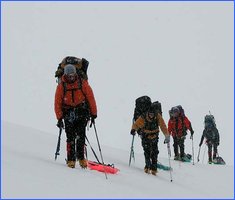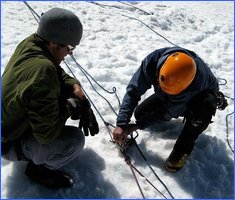Denali Prep Course - Expedition Training Course
John Race completed his 23th Denali Expedition in the summer of 2019. This is an opportunity to learn from a guide that has successfully climbed Denali 19 times and learned a few tricks for making things easier along the way. This program will give you the basic skill set you will need for a mountaineering expedition to Denali or for extended winter backcountry travel. Our scheduled programs take place on Mt. Baker, but we also have the ability to run this in other venues if you would like to get out earlier in the season.
The basic goal of the program is to have participants master the cold weather survival skills they will need on a big, cold-weather climb. Past participants have used this program as preparation for Denali, Mt. Vinson, Cho Oyu, and other big mountains. Northwest Mountain School owners, John Race and Olivia Cussen have in combination led 33 expeditions to Denali, have each guided Mt. Rainier to the summit in winter, have climbed Rainier over 200 times, and both have climbed 8000 meter peaks. John has participated in ski expeditions with the US Army in the mountains north of Fairbanks, AK in mid winter, and spends most of each winter backcountry skiing near their home in Leavenworth, WA.
Topics discussed include: Frostbite and hypothermia, climbing at high-altitudes and acclimatization strategies, whiteout navigation, and route planning.
Skills practiced include: Crevasse rescue, use of snowshoes, use of crampons, glacier travel, avalanche rescue, avalanche beacon use, snow caves, construction of secure winter camps, basic knots and hitches, use of camping stoves, ascent of fixed lines, snow and ice anchors, and the use of sleds including sled rigging.
Itinerary
This is a sample itinerary:Day 1: Meet in Marblemount, WA and do a thorough equipment check. Guide will demonstrate proper packing technique. Drive to trailhead and hike into base area. Review of camp construction techniques including: snow walls, tent platforms, tent anchors, kitchen and latrine construction.
Day 2: Review of basic mountaineering skills such as use of the ice axe and crampons, roped travel on glaciers, and ice axe self-arrest. Move camp to higher location and build second camp. Sled rigging and use is usually covered here.
Day 3: Review of basic knots and anchors, snow and ice anchor construction, crevasse rescue, and ascending fixed lines using both mechanical ascenders and prussic type systems. Evening discussion of route finding, whiteout navigation, and route plans.
Day 4: Summit climb of major peak in North Cascades National Park, Mt. Adams or Alpine Lakes Wilderness. This is where we get to put together all of the skills learned on days 1-3 as we make a summit attempt on one of many remote, snow covered peaks in the Cascades. Evening lectures include topics such as mountain medicine.
Day 5: Additional training day or weather contingency day. This is the day we use to mop up all of the skills we have not had a chance to cover, as an alternate summit day, or as an extra day if really bad weather leaves us tent bound.




